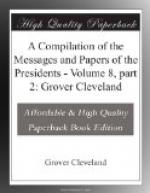it and gone on a crusade to overthrow that same
government is absurd if considered in the mere light
of justice. The severest justice may not always
be the best policy. The principle of seizing
and appropriating the property of the persons embraced
within these sections is certainly not very objectionable,
but a justly discriminating application of it would
be very difficult, and to a great extent impossible.
And would it not be wise to place a power of remission
somewhere, so that these persons may know they have
something to lose by persisting and something to save
by desisting? I am not sure whether such power
of remission is or is not within section 13.
Without any special act of Congress, I think our military commanders, when, in military phrase, “they are within the enemy’s country,” should in an orderly manner seize and use whatever of real or personal property may be necessary or convenient for their commands, at the same time preserving in some way the evidence of what they do.
What I have said in regard to slaves while commenting on the first and second sections is applicable to the ninth, with the difference that no provision is made in the whole act for determining whether a particular individual slave does or does not fall within the classes defined in that section. He is to be free upon certain conditions, but whether those conditions do or do not pertain to him no mode of ascertaining is provided. This could be easily supplied.
To the tenth section I make no objection.
The oath therein required
seems to be proper, and the remainder
of the section is substantially
identical with a law already existing.
The eleventh section simply assumes to confer discretionary powers upon the Executive. Without the law I have no hesitation to go as far in the direction indicated as I may at any time deem expedient. And I am ready to say now, I think it is proper for our military commanders to employ as laborers as many persons of African descent as can be used to advantage.
The twelfth and thirteenth sections are
somewhat better than
objectionable, and the fourteenth is entirely
proper if all other parts
of the act shall stand.
That to which I chiefly object pervades most parts of the act, but more distinctly appears in the first, second, seventh, and eighth sections. It is the sum of those provisions which results in the divesting of title forever. For the causes of treason and the ingredients of treason not amounting to the full crime it declares forfeiture extending beyond the lives of the guilty parties, whereas the Constitution of the United States declares that “no attainder of treason shall work corruption of blood, or forfeiture except during the life of the person attainted.” True, there seems to be no formal attainder in this case; still, I think the greater punishment can not be constitutionally




